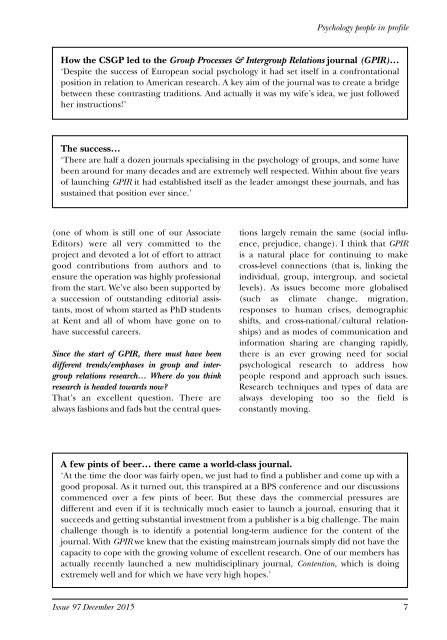Social Psychology Special Issue
PsyPAG-Quarterly-Issue-973
PsyPAG-Quarterly-Issue-973
You also want an ePaper? Increase the reach of your titles
YUMPU automatically turns print PDFs into web optimized ePapers that Google loves.
<strong>Psychology</strong> people in profile<br />
How the CSGP led to the Group Processes & Intergroup Relations journal (GPIR)…<br />
‘Despite the success of European social psychology it had set itself in a confrontational<br />
position in relation to American research. A key aim of the journal was to create a bridge<br />
between these contrasting traditions. And actually it was my wife’s idea, we just followed<br />
her instructions!’<br />
The success…<br />
‘There are half a dozen journals specialising in the psychology of groups, and some have<br />
been around for many decades and are extremely well respected. Within about five years<br />
of launching GPIR it had established itself as the leader amongst these journals, and has<br />
sustained that position ever since.’<br />
(one of whom is still one of our Associate<br />
Editors) were all very committed to the<br />
project and devoted a lot of effort to attract<br />
good contributions from authors and to<br />
ensure the operation was highly professional<br />
from the start. We’ve also been supported by<br />
a succession of outstanding editorial assistants,<br />
most of whom started as PhD students<br />
at Kent and all of whom have gone on to<br />
have successful careers.<br />
Since the start of GPIR, there must have been<br />
different trends/emphases in group and intergroup<br />
relations research… Where do you think<br />
research is headed towards now?<br />
That’s an excellent question. There are<br />
always fashions and fads but the central questions<br />
largely remain the same (social influence,<br />
prejudice, change). I think that GPIR<br />
is a natural place for continuing to make<br />
cross-level connections (that is, linking the<br />
individual, group, intergroup, and societal<br />
levels). As issues become more globalised<br />
(such as climate change, migration,<br />
responses to human crises, demographic<br />
shifts, and cross-national/cultural relationships)<br />
and as modes of communication and<br />
information sharing are changing rapidly,<br />
there is an ever growing need for social<br />
psychological research to address how<br />
people respond and approach such issues.<br />
Research techniques and types of data are<br />
always developing too so the field is<br />
constantly moving.<br />
A few pints of beer… there came a world-class journal.<br />
‘At the time the door was fairly open, we just had to find a publisher and come up with a<br />
good proposal. As it turned out, this transpired at a BPS conference and our discussions<br />
commenced over a few pints of beer. But these days the commercial pressures are<br />
different and even if it is technically much easier to launch a journal, ensuring that it<br />
succeeds and getting substantial investment from a publisher is a big challenge. The main<br />
challenge though is to identify a potential long-term audience for the content of the<br />
journal. With GPIR we knew that the existing mainstream journals simply did not have the<br />
capacity to cope with the growing volume of excellent research. One of our members has<br />
actually recently launched a new multidisciplinary journal, Contention, which is doing<br />
extremely well and for which we have very high hopes.’<br />
<strong>Issue</strong> 97 December 2015 7


